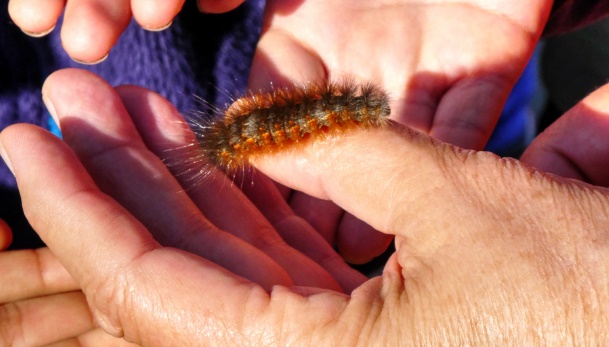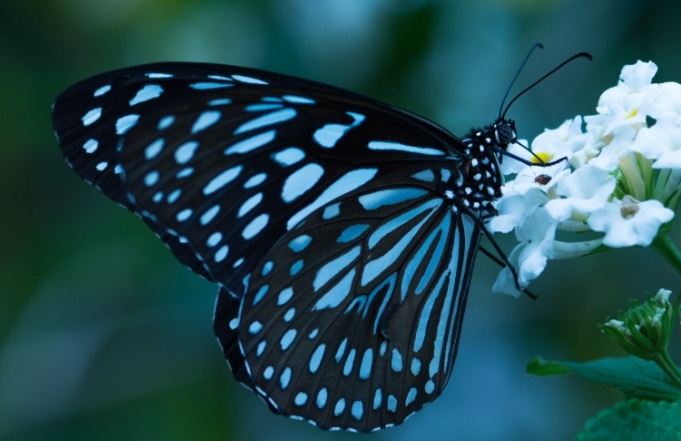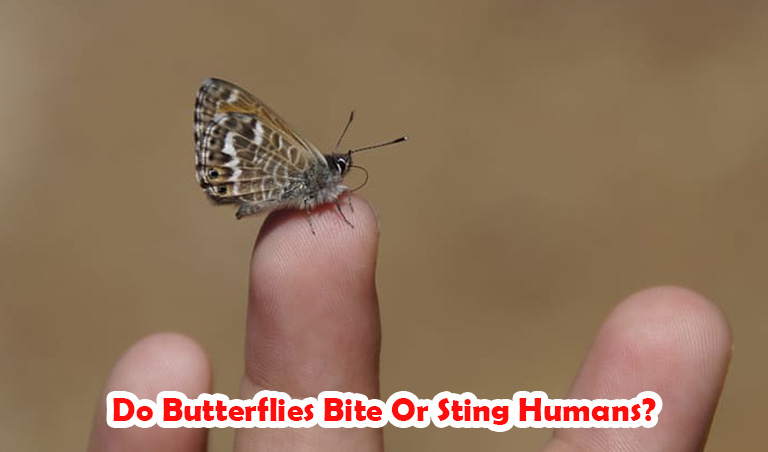Do Butterflies Bite Or Sting Humans?
Butterflies don’t bite simply because they can’t!
Basically, an animal needs to have a mouth with teeth to bite, and most butterflies don’t have the suitable physical features for this activity.
When consuming food, butterflies use a special straw-like structure known as proboscises to suck on nectar and some other liquid food. However, they have other means to defend themselves if threatened.
What you will learn after reading this article:
- Why butterfly can’t bite?
- Caterpillars are more dangerous than butterflies.
- Signs of poisonous butterflies.
- Butterfly poisoning symptoms & treatment.
Butterflies Don’t Bite, Touching Them Is Harmless
So, a butterfly can’t hurt you with its mouth or teeth since it has no such thing. Once the butterfly reaches its adult state, it no longer has jaws, only proboscises to curl and uncurl like a straw.
It’s safe for you to touch a butterfly too. The fragile wings, with no sharp edges, aren’t meant to scratch or cut you, and they carry no venom or potentially harmful substances that you need to worry about.
Scientists also proved that the bacteria residing in butterflies are not harmful to human or animal bodies. Perhaps, the only concern for you when dealing with butterflies is the pollen stuck on their body parts, in case you are allergic to it.
But exceptions always exist against the laws of nature!
Some micromoths (still classified in the same group as butterflies) are more inclined to chew than sucking with their mouths, yet biting is not their thing either!
While direct contact with butterflies isn’t a problem, these charmers are not entirely harmless. For example, they can do the same as mosquitoes or flies do and transmit diseases during their flight.
Love butterflies, check now: Butterfly Jewelry & Butterfly Gifts
But Caterpillars Are Another Story!
Before adult butterflies exist, they have to go through the caterpillar phase, and it’s what we should pay attention to. Unlike the absence of butterfly bite teeth, caterpillars have suitable features for biting and chewing.
As caterpillars, especially when they transform into larvae, they contain some toxins from the plants they host and feed off. It is part of their defense mechanism against predators trying to attack them.
Caterpillars are also considered pests. The most notorious example is the white butterfly caterpillar. If you grow crops like broccoli or cabbage, you wouldn’t want to see them in your garden.

Be Aware Of Poisonous Butterflies
The first thing to write down in your notebook is “Yes, some butterflies are poisonous and the attractive, radiant colors are usually a reliable indicator”.
Monarch butterflies consume milkweed plants as larvae, hence the toxins are incorporated in their bodies in various concentrations. Depending on which spot is attacked, the butterflies can give their predators a bitter taste or induce a vomit reaction.
Some other well-known names include Pipevine Swallowtail, Blue Tiger Butterfly, and African Swallowtail. They all consume plants with toxins that make them unappealing or unconsumable to predators.

Read more: Do Butterflies Lay Eggs?
Signs of Butterfly Poisoning
It’s completely normal if you have never heard of butterfly poisoning before, as butterflies are never labeled as lethal to humans. The most likely case for such a thing to happen is when you ingest a sufficient amount and handle the situation carelessly.
However, if the toxins truly come into contact with you, you might feel the discomfort called poisoning symptoms. How severe these symptoms are depends on your physical condition, the amount of toxins involved, and the level of toxicity.
Keep your eyes open for these signs:
- Cardiac: Cardiac glycosides in gorgeous Monarch butterflies can affect the heart negatively and trigger palpitations, uneven heartbeats, and mild to serious chest pain.
- Neurological: When exposed to toxins to an alarming extent, you might feel your body growing weak, your head dizzy with a sense of confusion, and seizures in the worst cases.
- Gastro-Intestinal: With a small amount of butterfly poisons, abdominal pain, nausea, or diarrhea are expected symptoms, which are related to butterflies’ defensive mechanism.
- Allergic: It strongly depends on your body, yet sometimes components from butterflies can cause skin irritation or difficulty in breathing. If you don’t have any medicine or method to alleviate the allergic reactions, the situation might become alarming.
- Systemic: In more serious cases, toxic butterflies can damage or fail our organs. Nonetheless, no butterflies are that dangerous, and such severe consequences are not common.
If you are in doubt, get medical help right away for a precaution.
However, most experts will not recommend handling or consuming butterflies or caterpillars whether you have experience with them or not, especially when you are not familiar with their species.
How to treat
Getting poisoned by butterflies is unusual, and specific medical treatments depend on the type and the extent of the symptoms.
Here are some actions you can take.
- Contact medical services: When an individual is showing strange symptoms, take them to the first hospital you can find, or contact hotlines for emergencies.
- Don’t try to make them vomit: Vomiting will weaken the patient instead of soothing them. Unless an expert advises you to do it, do not attempt it at all!
- Identify the species: If there is any chance of butterflies being the cause, getting more information about them can help with the treatment.
- Provide medical records: Other than the timing of the situation and the observed signs, a history of the patient’s condition and similar symptoms in the past might be helpful as well.
- Wash up: When the exposure is on the skin, the medical expert might instruct you to clean the affected area to avoid further poisoning.
The Takeaways
In conclusion, butterflies don’t bite and you shouldn’t have to worry about butterfly bite treatments ever!
Butterfly poisoning is a possibility only if you ingest a dangerous amount of their toxins and handle the situation wrongly. As always, the best solution when in trouble is to avoid further exposure and seek professional help.

